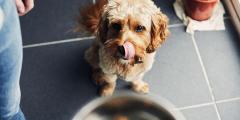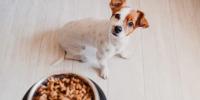
If your puppy is not eating dry food, there could be many reasons as to why. For one, you could just simply be dealing with a picky eater, or this can be a sign of something more serious. Read on to learn about some of the factors that can lead to your puppy not eating dry food.
Your puppy’s health
If your puppy has stopped eating his food suddenly when he otherwise has a robust appetite, it may be a sign that he is sick. If you suspect that something is wrong, make an appointment with your veterinarian. If you find that your dog is willing to eat other kinds of food, like wet food or snacks, but refuses to touch his dry food, he may just be a picky eater.
Your puppy’s age
The majority of puppies are not fully weaned off their mother’s milk until they reach six to eight weeks of age. For the first few weeks of your puppy’s life, he will not have any interest in dry food. However, once he’s three to four weeks of age, he will start to nibble at solid foods.
If your puppy in under three to four weeks of age, he may be too young to eat regular dry food for his meals. In most cases, pet owners do not adopt or receive their puppy from the breeder until the puppy is six to eight weeks old and fully weaned.
If your puppy is teething
Puppies have a tendency to eat less and chew more when they are teething. This typically takes place between three and six months old. Your puppy may have tender gums and loose teeth at this time, which can make dry food unappealing.
If your puppy is teething, you can try to moisten his kibble with warm water or mixing it with wet food so that it’s easier to chew. If you do decide to add wet food to his meal, remember to decrease the amount of dry food to make sure you’re not overfeeding him.
Your puppy’s feeding schedule
Making sure that your puppy is fed on a regular schedule can help him regulate his digestive system. As a bonus, it also gives you a sense of when your puppy will need to be let outside to go to the bathroom. As a general rule, puppies under six months of age should be fed small meals three times a day. After six months, you should feed your puppy twice a day, with one meal in the morning and one in the evening. When your puppy reaches maturity (at one year of age for most puppies, two for giant breed puppies), you can make the decision as to whether you want to feed him once or twice a day.
Your puppy’s tastes
The taste and texture of some foods can lead to your puppy not eating dry food. Taste and texture preferences vary from person to person – and it’s the same for dogs. If your puppy refuses to eat his dry food, you may want to mix some wet food into his kibble to make it more appealing. You can also moisten the dry food by using three parts kibble and one part warm water.
Read our article on how to feed a puppy for more tips on feeding your puppy and making sure he gets the nutrition he needs to grow.
Related articles



